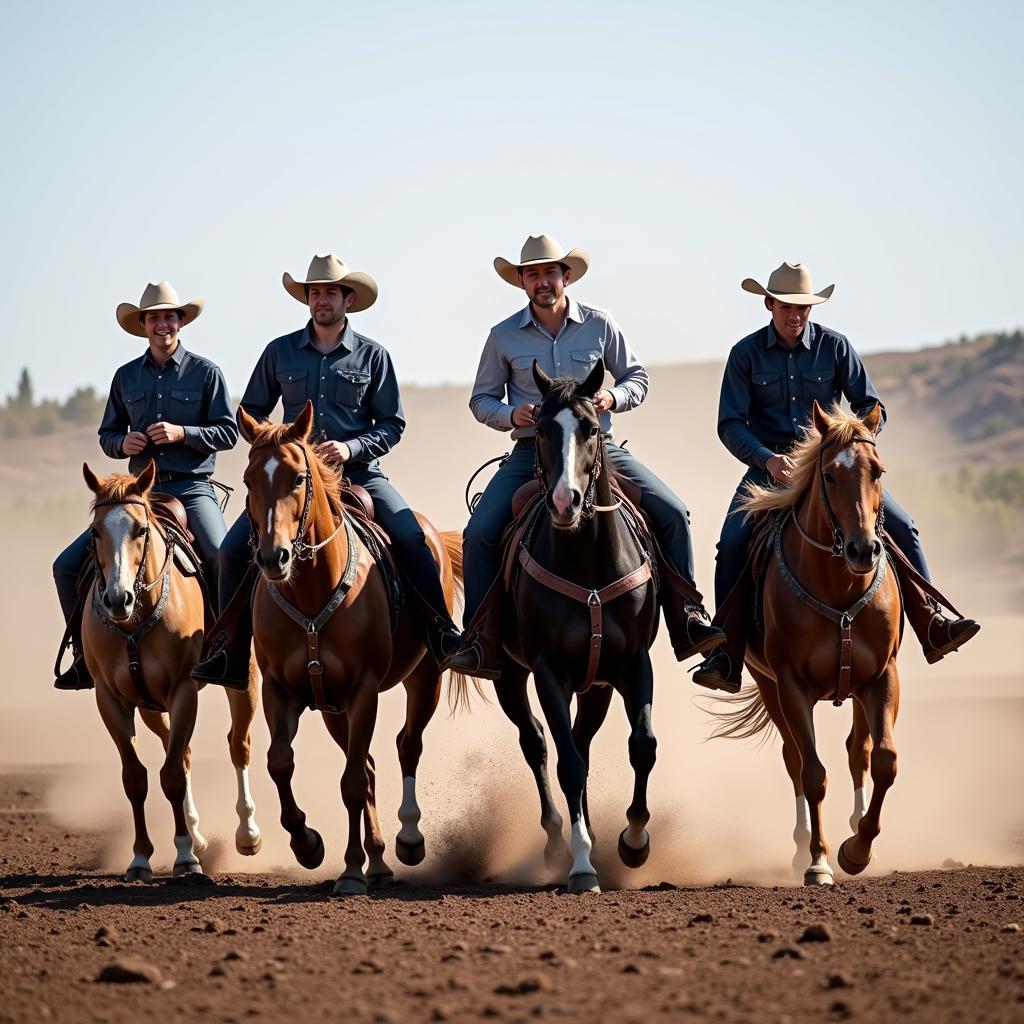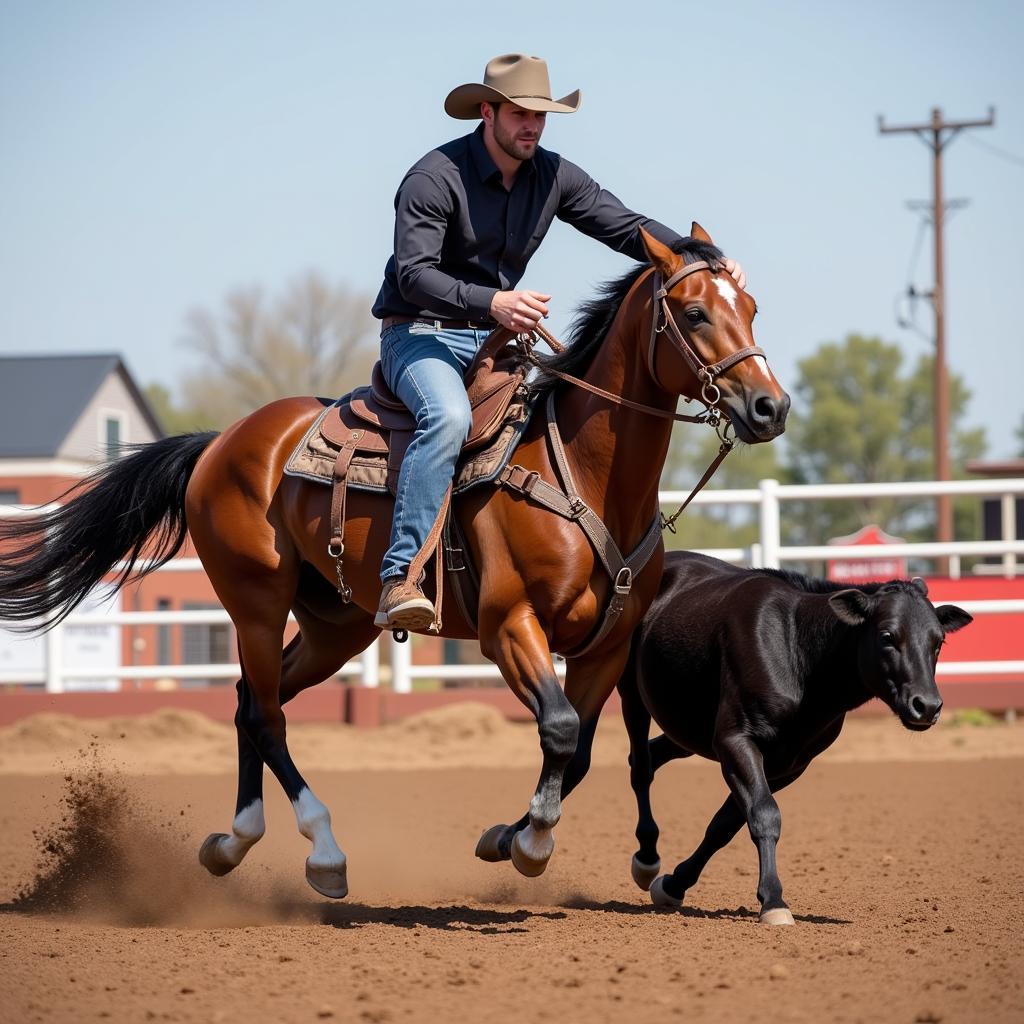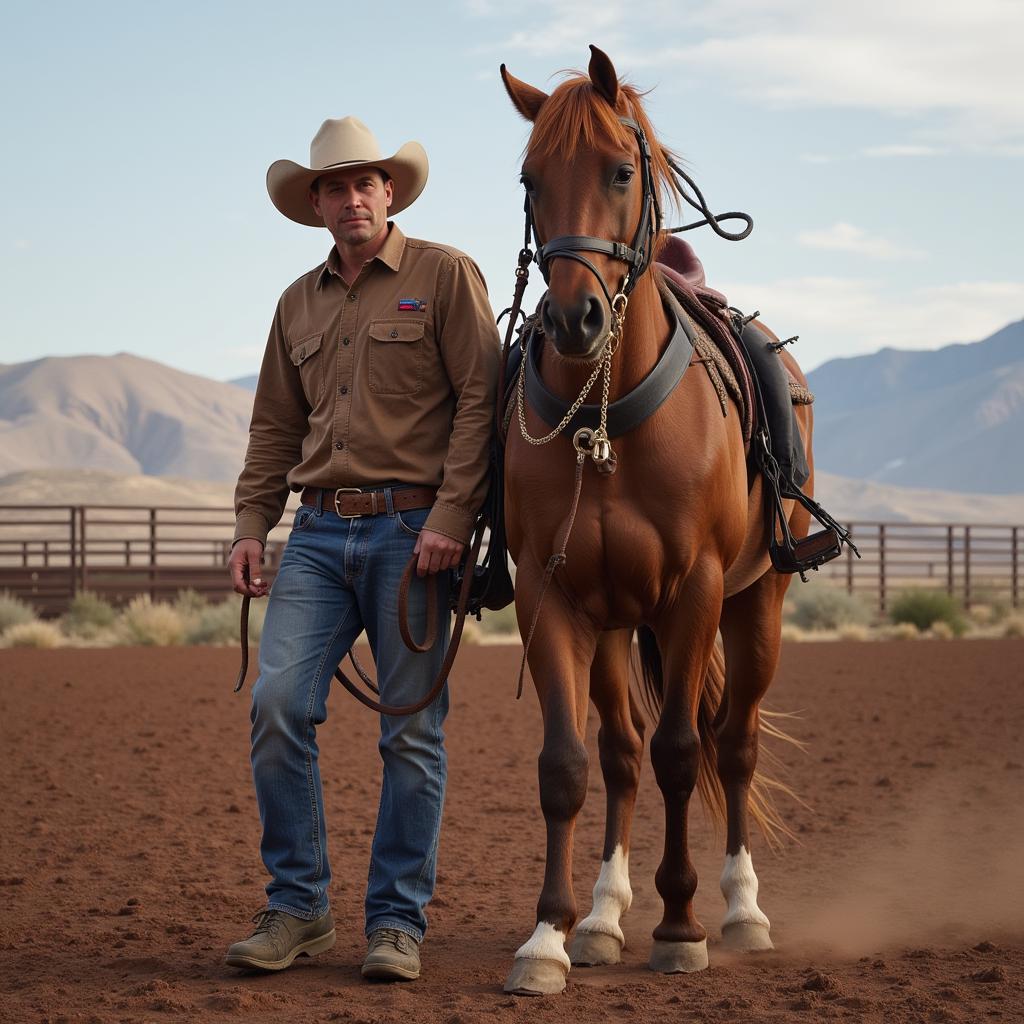When it comes to the fast-paced world of rodeo, choosing the Best Roping Horse Breeds can be the difference between a winning run and a missed opportunity. These equine athletes need a unique blend of strength, agility, and intelligence to excel in the arena. Finding the right roping horse breed that complements your roping style and skill level is key to success in this exciting competition.
Understanding the Qualities of a Top Roping Horse
Before we delve into specific breeds, let’s outline the characteristics that make a great roping horse:
- Cow Sense: This refers to a horse’s innate ability to read a cow’s movements and anticipate its next move. It’s a combination of instinct and learned behavior that allows the horse to work in sync with the rider during roping.
- Athleticism: Roping requires bursts of speed, quick stops, and sharp turns. Look for horses with powerful hindquarters, balanced conformation, and natural athleticism.
- Trainability: A willing and intelligent horse will learn the intricacies of roping more readily. They should be responsive to cues, eager to please, and have a calm temperament under pressure.
- Temperament: A calm, quiet, and collected demeanor is essential, especially for beginners. A horse that is easily spooked or overly reactive can be dangerous in the high-pressure environment of a rodeo.
 Top Roping Horse Breeds in Action
Top Roping Horse Breeds in Action
Top Roping Horse Breeds
While many breeds can excel at roping, some have earned a reputation for their natural abilities in this discipline. Here are some of the most popular and successful roping horse breeds:
1. American Quarter Horse
The quintessential all-American breed, the Quarter Horse is renowned for its versatility and athleticism. They are well-suited for both heading and heeling, with their compact build, powerful muscles, and “cow sense” ingrained through generations of ranch work.
- Strengths: Quick bursts of speed, agility, trainability, calm temperament.
- Considerations: May require experienced handling to reach full potential.
2. American Paint Horse
Closely related to the Quarter Horse, the American Paint Horse shares many of its desirable qualities for roping. Known for their striking color patterns, they also possess the intelligence, cow sense, and athleticism needed to excel in the arena.
- Strengths: Similar to the Quarter Horse, with the added benefit of eye-catching coat colors.
- Considerations: Individual temperament and trainability can vary.
3. Thoroughbred
While often associated with racing, Thoroughbreds can also make excellent roping horses, particularly for heading. Their speed, stamina, and agility give them an edge in covering ground quickly and reaching the steer.
- Strengths: Exceptional speed, agility, endurance.
- Considerations: May require more experienced handling due to their sensitive nature.
 American Quarter Horse Roping a Steer
American Quarter Horse Roping a Steer
4. Mustang
Known for their hardiness and survival instincts, Mustangs can also be trained for roping. Their natural agility, sure-footedness, and stamina make them capable partners in the right hands.
- Strengths: Hardiness, stamina, agility, sure-footedness.
- Considerations: Require experienced training and handling due to their independent nature.
5. Appaloosa
Recognized for their distinctive spotted coat patterns, Appaloosas are another versatile breed that can excel in roping. They are intelligent, athletic, and known for their calm temperament, making them suitable for riders of varying skill levels.
- Strengths: Calm temperament, intelligence, athleticism, striking appearance.
- Considerations: Individual aptitude for roping may vary.
 Cowboy and his Roping Horse
Cowboy and his Roping Horse
Factors to Consider When Choosing a Roping Horse Breed
- Your Roping Style: Are you a header or a heeler? Different breeds excel in each role, so choose one that complements your preferred style.
- Experience Level: Some breeds are more suitable for beginners, while others require experienced handling to manage their energy and athleticism.
- Individual Horse Temperament: Regardless of breed, always assess the temperament and trainability of the individual horse. A calm, willing, and responsive horse will make the learning process more enjoyable and successful.
Tips for Finding Your Ideal Roping Partner
- Work with a Reputable Trainer: A knowledgeable trainer can help you identify horses with the right qualities and guide you through the selection process.
- Attend Roping Events: Observing different breeds in action can give you valuable insights into their strengths and weaknesses.
- Test Ride Potential Horses: Nothing beats spending time in the saddle to gauge a horse’s responsiveness, temperament, and suitability for your roping goals.
Conclusion
Finding the best roping horse breed for you is a personal journey that involves careful consideration of your skills, goals, and preferences. By understanding the key qualities to look for and researching different breeds, you can find a partner that will help you thrive in the thrilling world of rodeo roping. Remember, building a strong bond built on trust and respect is essential for a successful partnership in and out of the arena.
FAQs About Roping Horse Breeds
1. What is “cow sense” in a roping horse?
Cow sense refers to a horse’s innate ability to read and anticipate a cow’s movements, essential for successful roping.
2. Are Quarter Horses good for beginners in roping?
While Quarter Horses are known for their trainability, their athleticism may be better suited for riders with some experience.
3. Can Thoroughbreds be used for heeling?
While their strength lies in speed, Thoroughbreds can be trained for heeling but are more commonly seen in heading.
4. Are Mustangs suitable for experienced ropers only?
Yes, Mustangs typically require experienced handlers due to their independent nature and need for specialized training.
5. What is the best way to assess a roping horse’s temperament?
Spending time observing and interacting with the horse, ideally through test rides, is crucial to gauge their temperament.
Have more questions about roping horse breeds or finding the perfect equine partner?
Contact us at Justus Horses USA. Our team of experts can provide personalized guidance and help you every step of the way.
Phone: 0772127271
Email: [email protected]
Visit our location: QGM2+WX2, Vị Trung, Vị Thuỷ, Hậu Giang, Việt Nam.
We offer 24/7 customer support and are dedicated to helping you find the horse of your dreams.